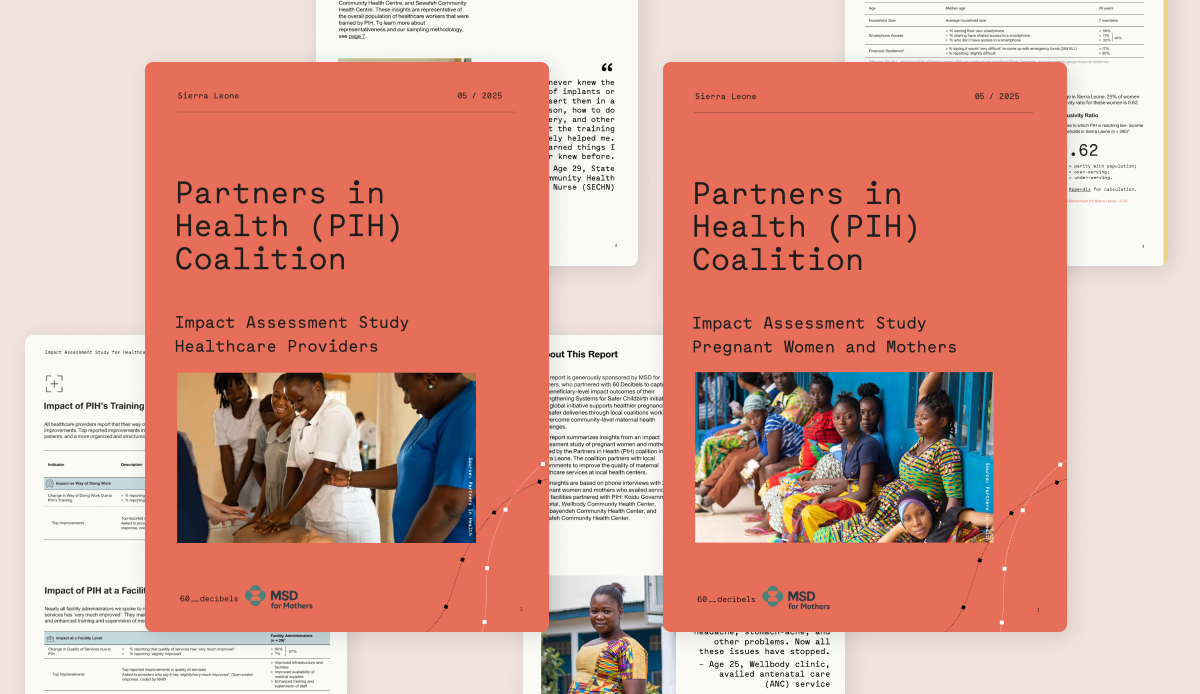
94% Recall, 100% Improvement: Training and Maternal Health in Sierra Leone
These reports have been sponsored by MSD for Mothers, who partnered with 60 Decibels to capture the beneficiary-level impact outcomes of their Strengthening Systems for Safer Childbirth initiative. While the initiative is global in scope, this report focuses on maternal health in Sierra Leone, where local coalitions are working to improve pregnancy and delivery outcomes by addressing community-level challenges.
The reports summarize insights from both the healthcare providers trained by the Partners in Health (PIH) coalition in Sierra Leone, and the pregnant women and mothers served by it. The coalition partners with local governments to improve the quality of maternal healthcare services at local health centers.
We spoke to 125 healthcare providers who participated in PIH’s training sessions at one of the partnering health facilities, and 283 pregnant women and mothers who availed services from PIH partnering facilities. Here’s what we found.
Healthcare Providers Key Insights
-
Inclusivity and Relative Wealth Profile
Healthcare providers trained by PIH are significantly wealthier when compared to the national average in Sierra Leone. 11% of healthcare providers trained by PIH live below the $1.90 poverty line in Sierra Leone compared to the national average of 40%. PIH’s inclusivity ratio for these healthcare providers is 0.29.
-
Impact of PIH’s Training
All healthcare providers report that their way of doing work has improved because of PIH’s training, with 9 in 10 noting significant improvements. Top reported improvements include improved knowledge of medical practices, communication and care with patients, and a more organized and structured way of working.
-
Impact on Women Served, as Perceived by Healthcare Providers
Nearly all healthcare providers report an increase in women’s visits to health facilities in the last 3-6 months, with all reporting an increase in visits for antenatal and postnatal checkups. All note an increase in women’s willingness to seek medical support. All healthcare providers also report a decrease in pregnancy and childbirth related deaths, mostly citing the good quality of care provided at facilities.
-
Engagement With PIH and Training
Nearly 9 in 10 healthcare providers express a desire for more frequent trainings, having engaged with PIH only once on average in the last six months. They find topics on maternal and neonatal care most useful, and request refresher training and sessions on family planning. While over half report being comfortable with online training, 46% say they are ‘not comfortable at all’.
100%
97%
94%
Pregnant Women and Mothers Key Insights
-
Inclusivity and Relative Wealth Profile
Women served by PIH’s partner facilities are slightly wealthier compared to the national average in Sierra Leone. 25% of women served by PIH live below the $1.90 line, compared to the national average of 40%. PIH’s inclusivity ratio for these women is 0.62.
-
Impact of Receiving Quality Care through PIH Facilities
Nearly all women report improved quality of life, improved household health, and increased likelihood of seeking professional health advice because of engaging with PIH’s partner facilities. Better awareness and management of health conditions, improved hygiene, and improved nutrition are the most common outcomes that women mention. Two-thirds of all women are sharing the information they learn with others and are encouraging more women to seek professional healthcare.
-
Barriers to Engagement with Healthcare Facilities
Half of all women visit the heath facility once a month. Very few women face challenges, and they complain about long wait times at health facility, unhelpful health staff, and unavailability of medicines. Women also mention mention financial constraints and a lack of convenient access to a health facility as barriers to making healthcare decisions. 8 in 10 women would be willing to pay for additional services.